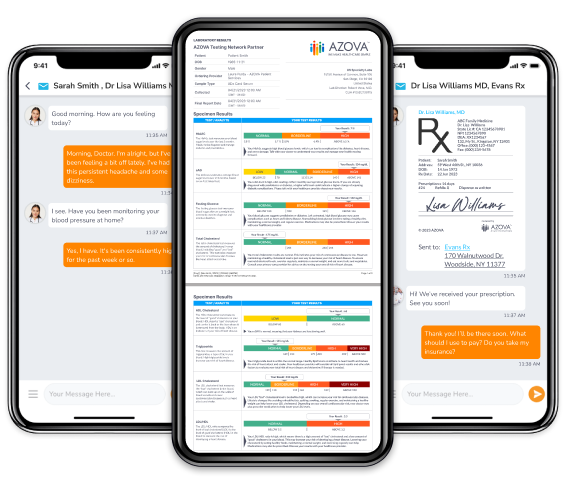Reliable diarrhea treatment, just a click away.
Connect with a board-certified healthcare provider for diarrhea relief via a quick, secured video visit or messaging. Receive a diagnosis and treatment plan, all without leaving home.
Available in all 50 states.

Understanding diarrhea
Diarrhea, characterized by frequent loose or watery stools, can range from a brief inconvenience to a chronic health issue. There are several types of diarrhea, each with its own potential causes and treatments.1-3
- Acute diarrhea: This is the most common type, lasting for a few days. It’s often caused by viral or bacterial infections.
- Persistent diarrhea: Lasting for two to four weeks, this type may require further investigation to determine the underlying cause.
- Chronic diarrhea: Diarrhea that persists for more than four weeks indicates an ongoing issue and should be evaluated by a healthcare professional.
Understanding the type of diarrhea you’re experiencing is crucial for effective management and potential treatment.
- Diarrhea symptoms in adults
- Diarrhea symptoms in children
- Diarrhea causes in adults and children
- Diarrhea treatments for adults
- Diarrhea treatments for children
Diarrhea symptoms in adults
Diarrhea involves frequent, watery bowel movements. While it often resolves on its own, certain symptoms may indicate a more serious condition. Common signs of diarrhea include:1-2
- Abdominal cramps or pain
- Bloating
- Nausea
- Vomiting
- Fever
- Blood or mucus in stool
- Urgent need to use the bathroom
Diarrhea symptoms in children
Children with diarrhea may experience the same symptoms as adults, but they are more susceptible to dehydration. Watch for these additional signs:1-2
- Persistent diarrhea lasting more than 24 hours
- Fever above 101°F
- Blood or black stools
- Signs of dehydration, such as dry mouth, decreased urine output, and lethargy
Diarrhea causes in adults and children 1, 2
Understanding the root cause of your diarrhea is essential for effective treatment. While it can be caused by various factors, identifying the underlying factors can help you find relief faster. Common causes include:
- Infections: Various pathogens, such as viruses, bacteria, and parasites, can cause infections for both adults and children. Rotavirus is a common cause of diarrhea in children.
- Dietary factors: Food intolerances, food poisoning, or excessive caffeine or alcohol consumption can lead to diarrhea.
- Medications: Antibiotics, laxatives, and other drugs may cause digestive upset.
- Medical conditions: Inflammatory bowel disease (IBD), irritable bowel syndrome (IBS), celiac disease, and other digestive disorders can contribute to diarrhea.
- Dehydration: While not a direct cause, severe diarrhea can lead to dehydration, which can worsen symptoms. This is particularly concerning in children, who are more susceptible to dehydration.
Diarrhea treatments for adults1, 3
Diarrhea can be uncomfortable and inconvenient, but it often resolves on its own within a few days. Treatment focuses on relieving symptoms, preventing dehydration, and addressing the underlying cause if necessary.
- Hydration is crucial. Drink plenty of clear fluids, such as water, broth, and oral rehydration solutions.
- Diet plays a role in recovery. Opt for bland foods like toast, bananas, and rice to soothe the digestive system. Avoid irritants like caffeine, alcohol, and dairy products.
- Over-the-counter medications can provide temporary relief. Anti-diarrheal medications, like loperamide, may help reduce stool frequency, but consult a doctor before use, especially for persistent symptoms.
- Consider probiotics. While research is ongoing, some studies suggest probiotics may help shorten the duration of diarrhea.
- Medical attention is necessary for severe cases. Seek professional help for persistent diarrhea, bloody stools, severe abdominal pain, or signs of dehydration.
- AZOVA Virtual Urgent Care offers convenient access to healthcare. Utilize online consultations for initial assessment, diagnosis, and treatment recommendations for diarrhea.
Diarrhea treatments for children1
- Oral rehydration solutions (ORS) are essential for replacing lost fluids and electrolytes. Offer ORS frequently in small amounts.
- Breastfeeding or formula feeding is crucial. Continue to nurse your baby or offer formula regularly, even if your child has diarrhea.
- Diet can help soothe the stomach. Offer bland foods like applesauce, crackers, and bananas. Avoid dairy products.
- Close monitoring for signs of dehydration is vital. Watch for symptoms like dry mouth, decreased urination, sunken eyes, and lethargy.
- Over-the-counter medications are typically approved for children aged 6 and older and can provide temporary relief. However, it’s crucial to consult a pediatrician before giving any medication to a child.
- Medical attention is necessary for severe cases. Seek immediate medical care for severe dehydration, bloody stools, high fever, or persistent vomiting.
- AZOVA Virtual Urgent Care provides convenient access to pediatricians. Utilize online consultations for initial assessment, diagnosis, and treatment recommendations for diarrhea.
Don’t suffer through a runny tummy. Get treatment for diarrhea today.
References
1National Institutes of Health (.gov). (2024, June 8). Pediatric Dehydration – StatPearls – NCBI Bookshelf. https://www.ncbi.nlm.nih.gov/books/NBK436022/
2Mayo Clinic. (2024, August 3). Diarrhea – Symptoms and causes. https://www.mayoclinic.org/diseases-conditions/diarrhea/symptoms-causes/syc-20352241
3Mayo Clinic. (2024, August 3). Diarrhea – Diagnosis and treatment. https://www.mayoclinic.org/diseases-conditions/diarrhea/diagnosis-treatment/drc-20352246
Need help or have questions?
Contact our AZOVA Customer Support team below
Live 24/7 chat
(quickest response)
You can chat with AZOVA’s Customer Support team for comprehensive support, including help with your account, testing, shipping, and results.
We typically respond within 5 minutes. Click the messaging icon on the lower right corner of the page to get started.



